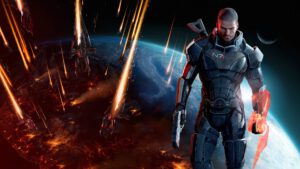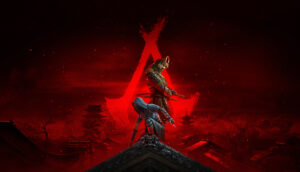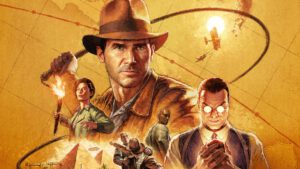With games, downloadable content, books, comics, and even an animated film, the chronological order of Mass Effect is a complicated one. There are tons of stories within the Mass Effect universe and a lot of them are told outside the games, which makes it hard to know where to start when you want to explore everything Mass Effect has to offer. Especially when you realize that a lot of the stories like to jump through time. Stories take place before, after, and during the events of the games and an earlier chapter doesn’t necessarily take place before a later chapter. Chronology be damned.
That’s why we have decided to make a Mass Effect timeline, showing you exactly when stories take place and in what order to read everything in. We even split up comics into separate issues, in case they decide to jump through time again. But first, the games:
- Mass Effect (2007)
This game takes place during the events of the Mass Effect trilogy. Also available as part of the Mass Effect Legendary Edition. - Mass Effect 2 (2010)
This game takes place during the events of the Mass Effect trilogy. Also available as part of the Mass Effect Legendary Edition. - Mass Effect 3 (2012)
This game takes place during the events of the Mass Effect trilogy. Also available as part of the Mass Effect Legendary Edition. - Mass Effect Andromeda (2017)
This game takes place during the events of Mass Effect Andromeda. - Mass Effect 5 (unknown)
It is not yet known when Mass Effect 5 will take place.
This entry was last updated in September 2021.
With all mainline games out of the way, it’s time to throw all other Mass Effect media in our Mass Effect timeline. The focus in this timeline is on the two main characters we control in the games: Shepard and Ryder.
In both cases, there’s a focus on the stories that take place during their games. But thanks to the prequels and Andromeda Initiative categories, we also have a clear overview of all the stories that take place before the videogame adventures of our two protagonists.
Prequels (2148-2183)

While a vast majority of the Mass Effect media doesn’t mind an interesting tidbit about its history here and there – like the existence of the ancient Leviathans and the decimated Inussanon – we don’t jump back too far in time when it comes to more expansive stories. The main focus of Mass Effect is humanity and they were somewhat late to the “we can travel through our galaxy at insane speeds now” party, discovering the means of Mass Effect travel in 2148.
Humanity’s first travels didn’t go over too well. In Mass Effect: Evolution we see an almost immediate conflict with the Turians, who enlighten humanity on a couple rules they weren’t aware off: activating a dormant Mass Relay without permission is very much forbidden.
That’s not the only story the Mass Effect prequels tell us however. In the first book, Mass Effect: Revelation, we follow a younger David Anderson, one of Shepard’s confidants in the Mass Effect trilogy. Revelation also introduces us to Kahlee Sanders, a character that has a prominent role in the four books that take place during the Mass Effect trilogy.
In the first comics, we see a lot of Shepard’s future team. The comics tell us more about Kaiden Alenko, Ashley Williams, Urdnot Wrex, Mordin Solus, Kasumi Goto, and Jeff “Joker” Moreau. Maya Brooks, a character that makes her videogame debut in Mass Effect 3’s Citadel DLC, also play an important role in the comics.
- Mass Effect: Evolution (included in Mass Effect: The Complete Comics)
- Mass Effect: Revelation
- Mass Effect: Foundation #1 (included in Mass Effect: The Complete Comics)
- Mass Effect: Foundation #4 (included in Mass Effect: The Complete Comics)
- Mass Effect: Foundation #10 (included in Mass Effect: The Complete Comics)
- Mass Effect: Homeworlds #1 (included in Mass Effect: The Complete Comics)
- Mass Effect: Foundation #9 (included in Mass Effect: The Complete Comics)
- Mass Effect: Homeworlds #2 (included in Mass Effect: The Complete Comics)
- Mass Effect: Foundation #2 (included in Mass Effect: The Complete Comics)
- Mass Effect: Foundation #3 (included in Mass Effect: The Complete Comics)
- Mass Effect: He Who Laughs Best (included in Mass Effect: The Complete Comics)
Mass Effect trilogy (2183-2186)

The Mass Effect trilogy – consisting of Mass Effect, Mass Effect 2, and Mass Effect 3 – focuses on one character: your Shepard. In the three game, the fate of the universe is at stake and it’s your job as Shepard to save the galaxy. With a focus on choices and creating your own narrative, it probably doesn’t surprise anyone that Shepard doesn’t show up in the stories told outside the games. But even without Shepard, there’s a lot to tell, making this the largest part of the Mass Effect timeline.
We already saw the comics Mass Effect: Foundation and Mass Effect: Homeworlds pop up during the prequels, but both comics also have issues that take place during the Mass Effect trilogy. Just like in the other issues, there’s a focus on a lot of characters that join Shepard’s team in the games, like Jacob Taylor, Miranda Lawson, Jack, Thane Krios, Zaeed Massani, Garrus Valkarian, and Liara T’Soni. Liara is even the lead character in Mass Effect: Redemption, a comic that takes places after Mass Effect 2’s prologue.
In Mass Effect: Ascension, Mass Effect: Retribution, and Mass Effect: Deception the stories of David Anderson and Kahlee Sanders continue. Kahlee Sanders even decides to show up in Mass Effect 3.
Mass Effect: Paragon Lost is the first (and so far only) animated film within the Mass Effect universe. It follows James Vega, a character that joins Shepard’s quest in Mass Effect 3. The film focuses on one of the missions Vega will tell you about in the game, if you’re willing to listen. James Vega also has a role in the comics.
While most of the comics in the Mass Effect Timeline tell us more about Shepard’s team, there’s also some issues that dive into some prominent side characters, like Captain Bailey and the Asari Aria T’Loak. Mass Effect: Invasion, the comic that mainly revolves around T’Loak, is strongly connected to Mass Effect 3’s Omega DLC.
There’s also two spin-off games for your mobile phone. The games focus on Jacob and Miranda, and Cerberus member Randall Ezno. While Jacob and Miranda end up joining Shepard during the events of Mass Effect 2, Ezno is a no show; Ezno’s story is limited to the one mobile game.
- Mass Effect (included in Mass Effect Legendary Edition)
- Mass Effect Galaxy (no longer available)
- Mass Effect: Incursion (included in Mass Effect: The Complete Comics)
- Mass Effect 2 – Prologue (included in Mass Effect Legendary Edition)
- Mass Effect: Foundation #5 (included in Mass Effect: The Complete Comics)
- Mass Effect: Foundation #6 (included in Mass Effect: The Complete Comics)
- Mass Effect: Redemption (included in Mass Effect: The Complete Comics)
- Mass Effect: Foundation #7 (included in Mass Effect: The Complete Comics)
- Mass Effect: Foundation #8 (included in Mass Effect: The Complete Comics)
- Mass Effect: Foundation #11 (included in Mass Effect: The Complete Comics)
- Mass Effect: Foundation #12 (included in Mass Effect: The Complete Comics)
- Mass Effect: Foundation #13 (included in Mass Effect: The Complete Comics)
- Mass Effect: Ascension
- Mass Effect: Paragon Lost
- Mass Effect: Homeworlds #3 (included in Mass Effect: The Complete Comics)
- Mass Effect 2 – up until the Collector base attack (included in Mass Effect Legendary Edition)
- Mass Effect 2: Lair of the Shadow Broker (DLC, included in Mass Effect Legendary Edition)
- Mass Effect 2: Arrival (DLC, included in Mass Effect Legendary Edition)
- Mass Effect 2 – after the Collector base attack (included in Mass Effect Legendary Edition)
- Mass Effect: Retribution
- Mass Effect: Inquisition (included in Mass Effect: The Complete Comics)
- Mass Effect: Deception
- Mass Effect: Conviction (included in Mass Effect: Invasion and Mass Effect: The Complete Comics)
- Mass Effect: Invasion (included in Mass Effect: The Complete Comics)
- Mass Effect: Infiltrator (no longer available)
- Mass Effect: Homeworlds #4 (included in Mass Effect: The Complete Comics)
- Mass Effect 3 – up until Priority: Earth (included in Mass Effect Legendary Edition)
- Mass Effect 3: Omega (DLC, included in Mass Effect Legendary Edition)
- Mass Effect 3: Arrival (DLC, included in Mass Effect Legendary Edition)
- Mass Effect 3: Citadel (DLC, included in Mass Effect Legendary Edition)
- Mass Effect 3 (Priority: Earth and the epilogue)
Andromeda Initiative (2176-2818)

As Commander Shepard, you decide the fate of the universe at the end of the Mass Effect trilogy. With a decision that impacts so much, it’s no surprise that the next stories not only take place much later in the Mass Effect Timeline, but even in a different galaxy altogether: Andromeda.
The story of Andromeda does however start during the original trilogy. With the start of the Andromeda Initiative in 2176, plans to go to the Andromeda galaxy are made. With a launch in 2185, the ships even leave before the entirety of Shepard’s story is told.
Mass Effect Andromeda: Initiation and Mass Effect: Discovery show us that launching ships to Andromeda isn’t that easy. A few organizations that oppose the plans do everything in their power to try and stop the ships from launching.
Even during the trip – that only takes a measly 600 years – not everything goes to plan, as shown in Mass Effect Andromeda: Annihilation. Mass Effect Andromeda: Nexus Uprising shows us that arriving in a completely new and undiscovered galaxy also brings its own challenges. Who knew.
Andromeda (2819)

Mass Effect: Andromeda takes places after the stories told in Andromeda Initiative. The gigantic ark Hyperion, that mainly carries humans to Andromeda, arrives in the new galaxy in 2819 and immediately stumbles unto multiple issues. It’s up to our new protagonist Ryder to fix these issues, find Arks that arrived earlier than Hyperion, and take his or her first steps in Andromeda as the Pathfinder.
Spin-offs

The digital comic Mass Effect: Blasto: Eternity is Forever is a bit of a weird one when it comes to Mass Effect media. The story revolves around a Hanar – the pink, floating jellyfish of the Mass Effect universe – who is a secret agent. The story is in no way connected to the stories Shepard or Ryder, and doesn’t really have a place in the Mass Effect timeline. Why? Blasto is not just fiction for us, but also for everyone living in the Mass Effect universe. This is the kind of comic people on the Citadel and in Omega read when they’re not hyperventilating in the corner of their room, worried sick about a Reaper invasion and the destruction of life as we know it.
This Mass Effect timeline was put together with the utmost care. If you do however end up seeing a mistake in our chronological order, don’t hesitate to let us know how wrong we are by filling out our contact form!




